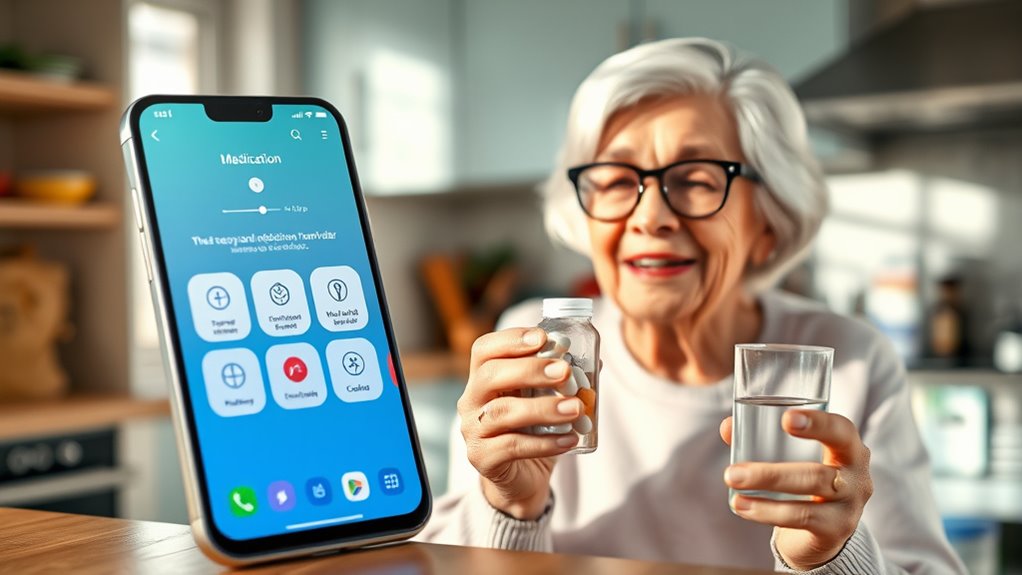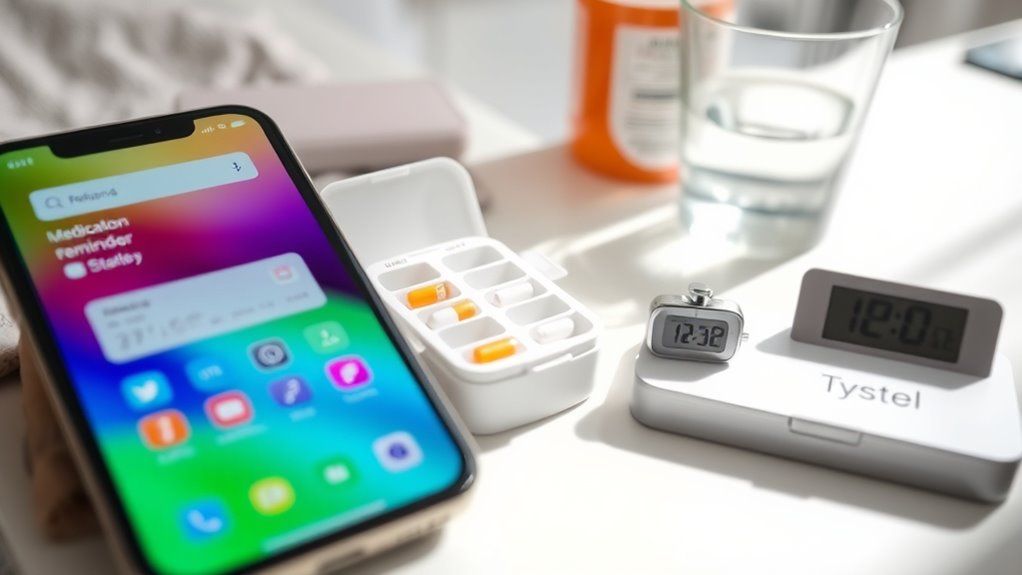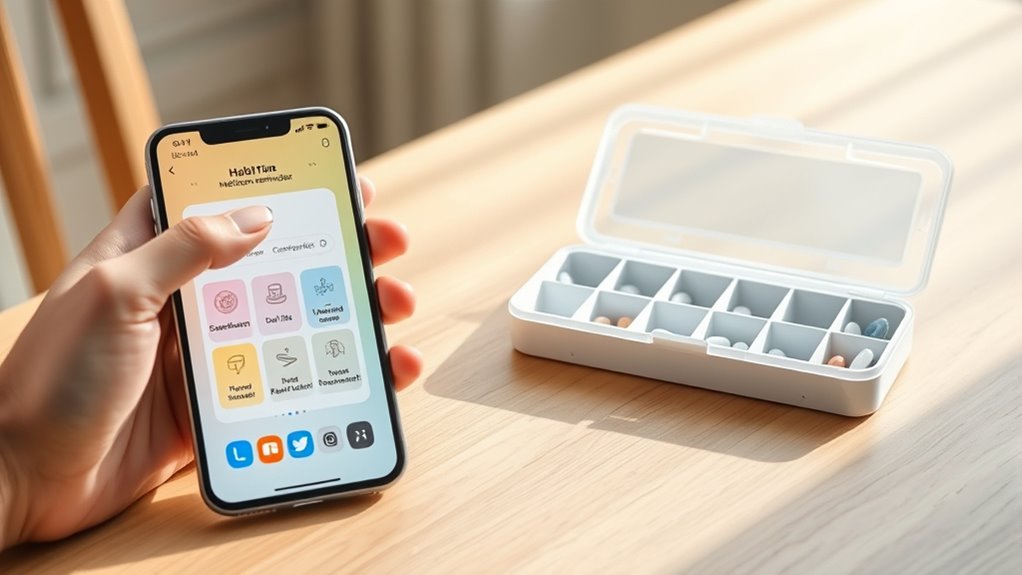Medication reminders are simple tools or methods to help you remember to take your pills on schedule. They can include alarms, notifications on your phone, pill organizers, or notes placed where you’ll see them. These reminders trigger alerts at set times, prompting you to take your medication. Using them can prevent missed doses and keep you organized. If you want to discover more about how these tools can work best for you, keep going for helpful tips.
Key Takeaways
- Medication reminders are tools or alerts that help you remember to take your pills on time.
- They include alarms, notifications, pill organizers, and notes to prevent missed doses.
- Reminders can be customized by time, message, and method to fit your routine.
- Using reminders regularly builds habits and makes medication management easier.
- Combining different reminder methods increases accuracy and ensures you stay on schedule.
What Are Medication Reminders?

Have you ever forgotten to take your medication on time? Medication reminders are tools or methods that help you stay on track with your prescribed doses. They guarantee you don’t miss pills or take them late, reducing the risk of medication side effects or complications. Proper pill identification is crucial to avoid mix-ups, especially if you take multiple medicines. Reminders can be simple alarms, digital alerts, or physical devices that prompt you when it’s time to take your medication. Using these tools helps you maintain consistency, which is essential for your health. They serve as your personal system to stay organized and informed, making sure you understand your medication schedule and avoid mistakes that could impact your well-being.
Different Types of Reminder Tools

You have several options when it comes to reminder tools for your medication schedule. Digital devices like alarms or smartphone apps offer automation, while traditional methods such as pillboxes or notes provide simplicity. Exploring these options helps you find the most effective way to stay on track. Self Watering Plant Pots can serve as a helpful analogy for understanding consistent and reliable reminder systems.
Digital Reminder Devices
Digital reminder devices have become essential tools for ensuring medication adherence, offering reliable and accessible solutions for busy schedules. These devices include smartphone apps and wearable devices that send timely alerts, helping you stay on track. They are customizable, allowing you to set reminders based on your routine and preferences. Using digital tools reduces missed doses and offers peace of mind. Here’s a quick comparison:
| Device Type | Features | Convenience |
|---|---|---|
| Smartphone Apps | Custom alerts, medication logs | Always with you |
| Wearable Devices | Vibration alerts, health data tracking | Hands-free, discreet |
| Smart Speakers | Voice reminders, hands-free access | Easy to use anywhere |
| Digital Pillboxes | Visual cues, alarm sounds | Visual reminder |
| Combination Tools | Sync multiple devices | Enhanced adherence |
Choosing the right digital device helps you manage medication effectively.
Traditional Reminder Methods
Traditional reminder methods rely on simple tools and routines to jog your memory about taking medication. You might use pill organizers to separate doses by day or time, making it easier to keep track. These containers help you avoid missed doses and prevent taking extra pills. Paper calendars are another effective tool; you can mark off each dose or note scheduled times. Posting reminders on your fridge or bathroom mirror can also serve as visual cues. These methods are straightforward, affordable, and don’t rely on technology, making them accessible for everyone. While they may lack the automation of digital devices, they still effectively support your medication routine by creating consistent habits and visual reminders. Incorporating business insights can also help in establishing better medication management routines.
How Do Medication Reminders Work?

Medication reminders work by using different alert types and methods to notify you when it’s time to take your medicine. These alerts are triggered based on your personalized schedule, often through apps or devices. You can customize reminders to fit your routine, making sure you never miss a dose. Implementing security measures ensures that your personal health data remains protected during these reminders.
Reminder Types and Methods
Since effective medication management depends on timely intake, various reminder types and methods have been developed to help you stay on track. These include alarms, smartphone alerts, pill organizers, and manual checklists. The key is choosing a method that suits your reminder frequency needs, whether daily, weekly, or as needed. For example, a pill organizer can be pre-filled with doses for the week, reducing daily reminders. Digital reminders can alert you at specific times, ensuring you don’t forget doses. Combining methods often provides the best results. Proper color accuracy in your reminder devices can also improve visibility and ensure you notice alerts promptly.
How Alerts Trigger
When you set up reminders like alarms or smartphone alerts, they work by activating at specific times to catch your attention and prompt action. Here’s how they trigger:
- The device’s internal clock reaches your scheduled reminder time.
- The alarm sound rings or a visual notification appears on your screen.
- The alert captures your attention through sound, vibration, or visual cues.
- You’re prompted to take your medication without delay.
- The use of notification settings ensures that alerts are clear and immediate, utilizing alarm sounds to wake you up or alert you, and visual notifications to remind you visually. This ensures you don’t miss your dose, keeping your medication schedule on track efficiently.
Customization Options Available
You can customize medication reminders to fit your specific needs, making them more effective and less intrusive. With plenty of personalization options, you can choose how and when you receive alerts. Alert customization allows you to set reminders for specific times, days, or even in different formats like sounds, vibrations, or pop-up notifications. You can also adjust the volume, message content, and frequency to match your routine. Some apps let you create multiple reminders for different medications, ensuring you never miss a dose. These customization options help tailor the experience, so reminders feel helpful rather than disruptive. By adjusting these features, you gain control over your medication schedule, making it easier to stay consistent and on track with your health. User preferences also play a key role in making medication reminders more effective.
Benefits of Using Medication Reminders

Medication reminders can considerably improve your health by ensuring you never miss a dose. They help keep your medication schedule on track, which is vital for effective treatment. Using reminders can also assist with pill identification, so you take the correct medication at the right time. Additionally, they promote better medication storage habits by reducing accidental overdoses or missed doses.
Medication reminders help prevent missed doses, support effective treatment, and promote safe medication habits.
Here are some key benefits:
- Prevent missed doses, supporting consistent treatment
- Enhance pill identification, avoiding confusion
- Improve medication storage practices for safety
- Reduce health risks from incorrect or forgotten medication intake
How to Choose the Right Reminder System for You

Choosing the right reminder system depends on your daily routine and personal preferences. If you prefer simple, physical tools, a pill organizer helps you see your doses at a glance. If you’re tech-savvy, reminder apps can alert you with notifications. Consider these options:
| Feature | Pill Organizer | Reminder Apps |
|---|---|---|
| Ease of Use | No batteries needed | Customizable alerts |
| Portability | Fits in your bag or pocket | Syncs across devices |
| Visual Reminder | Clear, physical layout | Digital notifications |
Think about your habits: Do you need visual cues or digital nudges? Do you want portability or simplicity? Matching your lifestyle ensures you stick with your medication routine.
Tips for Setting Up Effective Reminders

To set up effective reminders, start by selecting a system that aligns with your daily schedule and habits. Proper medication scheduling enhances reminder effectiveness and guarantees you never miss a dose. Here are some tips:
- Choose a consistent time each day to reinforce your routine.
- Use multiple alerts, like alarms and app notifications, to reinforce the reminder.
- Place medication in visible spots to trigger automatic prompts.
- Personalize reminders with clear, simple messages to boost adherence.
- Be aware of privacy policies when using digital apps to understand how your data is collected and used.
Common Challenges and How to Overcome Them

Even with well-designed reminders, obstacles can still make consistent medication intake challenging. Forgetfulness is a common barrier to medication adherence, causing missed doses and health setbacks. To overcome this, consider using forgetfulness solutions like alarms, smartphone alerts, or pill organizers with timers. Distractions, busy schedules, or fatigue can also interfere with your routine. Setting multiple reminders or placing medication in visible spots can help reinforce adherence. Avoid relying solely on memory; instead, integrate medication routines into daily activities. If forgetfulness persists, talk to your healthcare provider about additional strategies or support systems. Recognizing these challenges early and implementing practical solutions can appreciably improve your ability to stay consistent and maintain your health. Incorporating reliable reminder systems can significantly boost adherence rates.
Making Medication Reminders a Habit

Building a habit of taking your medication at the same time every day considerably boosts adherence. Using a pill dispenser aligned with your medication schedule makes this easier. To make it a routine: 1. Set a daily alarm or reminder to prompt you. 2. Keep your pill dispenser in a visible spot near your usual daily activities. 3. Link medication times to existing habits, like brushing your teeth. 4. Track your doses with a simple checklist or app to stay accountable. Consistency helps reinforce the habit, and a dedicated pill dispenser minimizes errors. Over time, taking your medication becomes automatic, reducing missed doses. Remember, establishing this routine is key to maintaining your health and ensuring your medication works effectively. Additionally, understanding the importance of medication adherence can motivate you to stay consistent with your routine.
Frequently Asked Questions
Can Medication Reminders Prevent Missed Doses Entirely?
Medication reminders can substantially improve your medication adherence, but they may not prevent missed doses entirely. Reminder effectiveness varies depending on your habits and the system you use. Some people find reminders highly helpful, while others might still forget sometimes. To maximize success, combine reminders with routines or support systems. Ultimately, consistent use and personalized strategies boost your chances of taking medication correctly and on time.
Are Digital Reminders Safe for Elderly or Disabled Users?
Digital reminders are generally safe for elderly or disabled users when designed with strong digital security features and user accessibility in mind. You should choose devices that offer simple interfaces, adjustable font sizes, and voice commands. Confirm your device has secure login options, like PINs or biometrics, to protect personal health information. When these safety measures are in place, digital reminders can be a reliable and secure way to manage medication schedules.
How Do I Update or Change My Medication Reminder Settings?
To update or change your medication reminder settings, start by opening the app or device’s settings menu. Look for options like “reminder customization” or “schedule,” then adjust the reminder frequency to match your needs. You can set new times, turn reminders on or off, or modify how often you get notified. Save your changes, and your reminders will update automatically, helping you stay on track with your medication schedule.
What Should I Do if I Forget a Dose Despite Reminders?
Did you know that about 50% of medication non-adherence is due to missed doses? If you forget a dose despite reminders, don’t panic. Use missed dose strategies like taking it as soon as you remember, unless it’s close to your next dose. Consult your healthcare provider for personalized advice, especially if missed doses become frequent. Staying proactive helps you stay on track with your medication.
Are There Privacy Concerns With Using Reminder Apps or Devices?
You might have privacy issues or concerns about data security when using reminder apps or devices. These tools often store sensitive health information, which could be vulnerable if not properly protected. To minimize risks, choose apps with strong security measures, read privacy policies carefully, and update your software regularly. Always be cautious about sharing personal health details and consider whether the app’s privacy features meet your comfort level.
Conclusion
Using medication reminders can markedly improve your health by ensuring you take your medicines on time. Did you know that people who use reminders are 30% more likely to stick to their prescribed schedules? By choosing the right tool and setting effective reminders, you turn medication into a simple habit. Stay consistent, and you’ll enjoy better health outcomes. Remember, making reminders part of your routine can make a real difference in managing your medications successfully.









